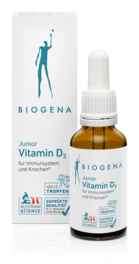Perfectly tailored to the needs of the newborn baby, breast milk and infant formula provide exactly the nutrients a baby needs to develop optimally. Despite this, it is important to pay special attention to vitamin D, the sun vitamin, in the first year of your child’s life, no matter whether they are breast-fed or bottle-fed. Why is additional vitamin D being recommended for even tiny babies? Isn’t it enough to spend a lot of time outdoors with your baby and supply the vitamin via food?
Why do babies need extra vitamin D?
The original way to feed a baby was to breastfeed. Breast milk is perfectly tailored to the needs of the infant, as it continuously adapts to the physiological needs of the child. Nevertheless, the composition of breast milk also depends on the mother's diet – and the current state of research shows that breast milk generally contains too little vitamin D. Even if formula is started, it is not enough as the sole source of vitamin D. In some countries, even industrially produced infant formulas are supplemented with small amounts of vitamin D, but even in this case, the need is not covered.
Why is vitamin D being given such a special position among the other vitamins?
Vitamin D is, as the name suggests, a vitamin – and yet it is not a vitamin in the strictest sense of the word. While vitamins and other essential micronutrients must be supplied through our food, our body can produce vitamin D itself with the aid of sunlight (optimum production is however limited to April to September, between 10 a.m. and 2 p.m.).
What does vitamin D do?
Vitamin D performs a number of key functions in the human body. This can be inferred from the many new findings of recent years, which indicate that almost all of our body’s organs and tissue have their own vitamin D receptors. Vitamin D is probably best known for its role as a bone vitamin. Vitamin D contributes to the normal absorption and utilisation of calcium and phosphorus and is thus crucially involved in the maintenance of bones. An adequate supply of vitamin D is therefore important for normal growth and development of the bone system, even in very young children. Vitamin D is also essential for developing effective immune response, as it contributes to the normal functioning of the immune system.
Intake & dosage
When should you give a baby vitamin D?
As a newborn, babies require vitamin D from day one. At the same time, the sensitive baby skin must be protected from the direct sun, so the baby should not be exposed to the full sun to promote vitamin D formation.
How much vitamin D does my baby need?
The German Society for Paediatric and Adolescent Medicine (DGKJ) recommends supplementation of 400 to 500 IU (10-12.5 μg) vitamin D daily shortly after birth. According to the DGKJ, this recommendation applies until the second early summer of the child.
Is it possible to overdose on vitamin D?
If you stick to the recommendations, there is no need to worry about overdosing your baby on vitamin D. Total intake refers to the intake of vitamin D via food, Vitamin-D-supplements and enriched foods. The recommended supplementation of up to 25µg per day for babies does not present an oversupply risk.
Forgotten to give vitamin D to the baby – is that bad?
Especially in the early months, you may forget to give your baby vitamin D. This is not bad as long as it doesn’t happen constantly. However, if it does happen, the little one should not be given a double dose, but the normal dose should be continued. If the dose has been forgotten over a longer period of time, consult your treating paediatrician, who can decide whether a larger dose for "catching up" is recommended.
Vitamin D for babies: drops or tablets?
Vitamin D is available in liquid, capsule or tablet form. Liquid applications are usually recommended, but it’s not always easy to place the vitamin D drops into baby’s mouth. However, if you first place the drop on a spoon, dummy or nipple, the drop will reach its destination more easily. Tablets or capsules are also available for children, but are not generally recommended due to the lack of ability to swallow and possible difficulties in administering dissolved powder. However, if dissolved tablets or opened capsules are chosen, it is important to pay attention to possible additives and their tolerability.
How long should you give babies vitamin D for?
How long babies should take vitamin D depends on when the baby was born. If the baby is a summer child, i.e. born between May and September, 12 months should be supplemented. If the baby was born in the autumn or winter, the administration of vitamin D should be prolonged until the second early summer is reached, i.e. between September and April. Depending on the time of birth, a duration of 1–1.5 years is therefore recommended.
Did you know that vitamin D supplements can be beneficial for children who are more than one year old?
This is because vitamin D levels depend less on dietary intake than on the amount produced by the body with the aid of sunlight. In the northern hemisphere however, the body’s own vitamin D production comes to a virtual standstill during the darker months, and even in the summer, the sun is too low for efficient synthesis in the morning and evening hours. In addition, other factors (e.g. sunscreen, skin type) can interfere with the body’s own production mechanisms, which is why you might want to consider giving children additional vitamin D supplements beyond the age of one – especially during the darker months of the year. Seek advice and determine the vitamin D status if necessary.
What else should you take into account when choosing a vitamin D supplement for your baby?
Parents are generally especially interested in premium product quality, particularly for very young children. But what do you need to pay attention to?
Which vitamin D tablets or capsules are best for babies?
Tablets or capsules are also available for children, but they are not generally recommended due to the child’s lack of ability to swallow and possible difficulties in administering dissolved powder. However, if dissolved tablets or opened capsules are chosen, it is important to pay attention to possible additives and their tolerability. It is worth taking a close look at the composition of the product. Capsules that do not contain any technological additives should be given preference over tablets with many unnecessary accompanying substances. Liquid preparations are easier to use and recommended in every case.
Which Vitamin D drops are best for babies?
Also in liquid applications, care should be taken to ensure that they contain no additives if possible. Do not choose products containing alcohol. Liquid preparations based on high-quality oils, such as sunflower oil that has a pleasant neutral taste, are ideal.
Why should you stop supplementation after one year? What is our recommendation?
The current official recommendations of the DGKJ provide for general vitamin D supplementation for babies only up to early summer in their second year. The reason for this is easy to explain. Health recommendations regarding supplementation that affect an entire age group are only made if there is a clear indication. For vitamin D, the clear indication in the first few months of life would be bone health, since vitamin D is required for normal growth and bone development in children.
Since the essential vitamin D formation in our climates in winter is insufficient for the vitamin D balance required and it is not possible to meet the need via food, supplementation in the winter months to support a healthy vitamin D level in children is worth considering.
Combine vitamin D and vitamin K for babies?
Since newborns do not have sufficient vitamin K reserves, the administration of vitamin K has been recommended in Austria for many years. While parents are responsible for supplementing vitamin D, vitamin K is administered by the paediatrician responsible. Healthy full-term and orally fed premature babies receive three doses – usually shortly after birth, on the 4th to 6th day and at the age of 4 to 6 weeks. Other methods of vitamin K prophylaxis, such as a daily low-dose or weekly administration for the duration of the first months of life, have not proven effective and are not recommended.
Conclusion: Babies need vitamin D from day one. However, they cannot form sufficient amounts of vitamin D themselves, nor should their sensitive skin be exposed to direct sunlight for the first year of life – and baby food and breast milk also contain too little. For this reason, parents are encouraged to provide their offspring with a corresponding vitamin D preparation until the child’s second early summer.
Do you want to know more about vitamin D?
We have summarised valuable information and tips on the topic of vitamin D for you here:
Frequently asked questions about vitamin D for babies & newborns
The German Society for Paediatric and Adolescent Medicine (DGKJ) recommends not only supplying bottle-fed babies, but also breastfed babies with 400 – 500 IU of additional vitamin D daily.
The Nutrition Commission of the German Society for Paediatric and Adolescent Medicine (DGKJ) provides for a supplementation of 400-500 IU (10-12.5 μg) vitamin D3 daily for babies.
Yes, because the ability to form vitamin D in babies only develops over time. In addition, their incredibly sensitive skin should not be exposed to direct sunlight.
The German Society for Paediatric and Adolescent Medicine (DGKJ) recommends supplying both bottle-fed children and nursing babies with additional vitamin D3 daily until their second early summer. It doesn’t matter at what time the vitamin is administered – the main thing is that you think about it every day.
Due to the baby’s growing bone structure, a good vitamin D supply is particularly important, because vitamin D contributes to the normal absorption/utilisation of calcium and phosphorus. Since infant formula and usually also breast milk contain insufficient amounts of vitamin D, a daily vitamin D supplement is definitely recommended for babies.
References:
Reinehr, T. et al. 2018. Vitamin-D-Supplementierung jenseits des zweiten Lebensjahres. Gemeinsame Stellungnahme der Ernährungskommission der Deutschen Gesellschaft für Kinder und Jugendmedizin (DGKJ e. V.) und der Deutschen Gesellschaft für Kinderendokrinologie und Diabetologie (DGKED e. V.). Monatsschr Kinderheilkd. 166:814–22.
Mansur, J. L. 2018. [Vitamin D in pediatrics, pregnancy and lactation.] Arch Argent Pediatr. 116(4):286–90.
Kramer, C. K. et al. 2016. The persistence of maternal vitamin D deficiency and insufficiency during pregnancy and lactation irrespective of season and supplementation. Clin Endocrinol (Oxf). 84(5):680–6.
Neth, C. 2017. Warum Säuglinge zusätzlich Vitamin D bekommen. PTA heute. https://www.ptaheute.de/aktuelles/2020/08/23/darum-bekommen-saeuglinge-zusaetzlich-vitamin-d (Stand 05/2021)








